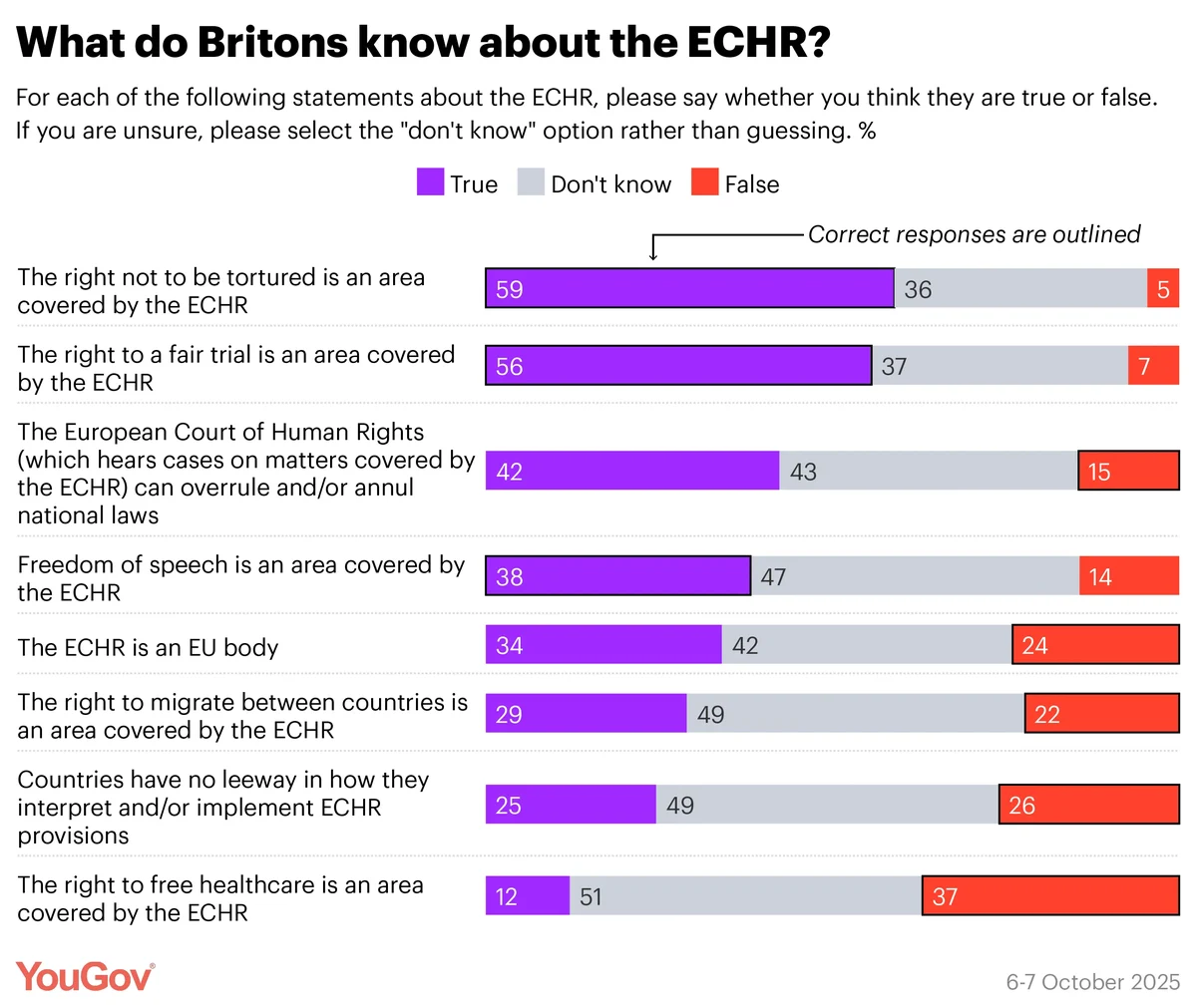The public are opposed to withdrawing from the Convention by 46% to 29%
Earlier this week Conservative leader Kemi Badenoch announced that the Tories would bring the UK out of the European Convention on Human Rights (ECHR) should they win the next election.
Badenoch and others have blamed the ECHR for preventing greater levels of migrant deportations, with Reform UK having likewise made the pledge in their 2024 election manifesto as part of their “Stop the Boats” plan.
How many Britons want to leave the ECHR?
Now a new YouGov survey shows that the public are generally opposed to leaving the ECHR, with 46% saying we should remain a member compared to 29% saying we should withdraw from it – the remaining 24% are unsure.
While seven in ten of those who currently intend to vote for Reform UK back withdrawal (72%), this falls to a much lower 44% of those who back the Conservatives, although this is still the plurality preference.
By contrast, 82% of current Labour voters want to remain within the Convention, as do 76% of Lib Dems and 85% of Greens.
Does pledging to leave the ECHR help the Conservative party’s image?
Kemi Badenoch will be hoping that this move will help coax some of the voters the Conservatives have lost to Reform back into the party fold. Our survey finds that 36% of current Reform UK voters do indeed say it makes them think more positively about the Conservatives – although a similar number (39%) say it made no difference to their views, and that they continue to dislike the Tories.
While the move has made 32% of current Tory voters feel more favourable about their party, it does appear to have alienated a further 12% who now say they feel more negative.
At a national level, 15% of Britons say they think more positively about the Tories as a result of the announcement, while 19% think more negatively. For half it makes no difference to their view, with the bulk of these saying their opinion of the Conservatives remains negative.
Whether or not this prompts any rapprochement between the Tory party and its wayward electorate remains to be seen, not least when Reform is making the same offer to withdraw from the Convention, without the baggage of the previous 14 years in government.
What do Britons think the impact of withdrawing from the ECHR would be?
Top of the list of 10 potential impacts we asked about comes “the level of control the UK has to set its laws”. Four in ten Britons (41%) think withdrawal from the ECHR would have a positive impact on sovereignty, compared to 12% who think it would have a negative impact, and 23% who don’t think it would make much difference.
Almost as many think that leaving the ECHR would have a positive impact on the number of migrants who can be successfully deported (39%), including 24% who think it would have a “major positive impact”.
These are the only two impacts where the plurality answer was that the impact would be positive.
Somewhat fewer think that withdrawal would actively reduce the number of migrants trying to come to the UK (29%), with 32% thinking it would make no difference.
At the other end of the table, Britons are most likely to see the negative potential impacts of leaving the ECHR as being the damage it would cause to the UK’s reputation with other countries (48%) and its weakening of security co-operation with other European nations (39%).
When it comes to the everyday rights of British citizens in their day to day lives, the public are more likely to think withdrawal would have a negative impact (33%) than a positive one (20%), while 26% think it would make no difference.
A similar number expect a negative impact on everyday rights for British minority groups (34%), but only half as many think there would be benefits (10%).
Given their preference for withdrawing from the ECHR, it is no surprise to see that current Conservative and Reform voters are more likely to think the impact of doing so will be positive.
This is particularly the case in terms of sovereignty and immigration: at least six in ten think leaving the ECHR will have a positive impact on the control the UK has over its own laws (60-72%) and the number of migrants who can be successfully deported (60-73%). The majority of Reform UK voters (59%) likewise think it will have a positive impact on the number of migrants coming to the UK, as do 45% of current Tories.
Fewer than half think withdrawal would have a positive impact on any other areas, although Tories and Reformers are still noticeably more likely to think it would than their Labour, Lib Dem and Green counterparts.
Notably, across all areas, Conservative and Reform voters either think the impact would be positive or at least would not be negative – an important grouping as this encapsulates the sentiment that there is little to lose by leaving the ECHR (which was likewise often the case for Leave voters ahead of the EU referendum).
What do Britons actually know about the ECHR?
Only 5% of Britons claimed to know a great deal about the ECHR, while a further 31% say they know “a fair amount”. Half (49%) say they don’t know very much, while 15% say they know nothing at all.
There is virtually no difference in proclaimed familiarity with the ECHR between those who want to remain members and those who want to withdraw, while current Labour voters are more likely than others to claim knowledge and Tory voters somewhat less likely.
When tested on their actual knowledge, the public are most likely to correctly identify that the right not to be tortured (59%) and the right to a fair trial (56%) are covered by the ECHR, although these are the only two of the eight true or false questions that most Britons got right.

Just 38% know freedom of speech is an area covered by the ECHR, and only 37% know that a right to free healthcare, and 22% the right to migrate, are not.
Only 24% correctly identified that the ECHR is not an EU body, while a similar number (26%) are right that countries have leeway in the interpretation/implementation of ECHR provisions. Just 15% correctly say that the European Court of Human Rights cannot overrule or annul national laws (they can only find them to be in violation and require the state to remedy the situation).
The results show that those Britons who want to remain in the ECHR are generally more likely to answer this battery of questions correctly – although in most cases fewer than half on both sides of the argument gave the correct answer.
The biggest difference between the two groups is on the right not to be tortured, which 64% of those who want to stay in the ECHR correctly stated is covered by the Convention, compared to 31% of those who want to withdraw.
What do you think about the ECHR, the impact that the UK withdrawing would have, and everything else? Have your say, join the YouGov panel, and get paid to share your thoughts. Sign up here.
Photo: Getty






